#Communist Era Serbia
Text
Spring in Belgrade Serbia 2024
There were some maladies involved in getting from Datça to Belgrade. Thankfully, at this point in my travels I’m somewhat “inoculated” from freaking out – it really doesn’t change anything. In short, the trip was a messy experience that I’m planning to forget ASAP. :o) Writing about it is a catharsis of sorts.
Street Art
Mediterranean Storm
After weeks of clear, picture-perfect weather, the night…

View On WordPress
#Belgrade Serbia#Communist Era Serbia#Dalaman Airport#Datça Turkey#General Milan Nedic#Kosovo#Medicanes#Metohija#Serbian Puppet Government#WWII German Military Administration
0 notes
Note
Idk why people say aph russia has no "friends". In real life, russia is quite close with serbia, bulgaria, vietnam, india, many central asian countries etc.
Wouldn't he be quite close with these countries he literally saved their lives (India, Bangladesh, Vietnam) ? Idk why hima wrote him as having no friends.
Yeah, esp speaking as an Indonesian. We are good or at least neutral with Russia lol (and the whole former USSR for that matter). Not that we’re close or anything these days, as we were only a bit close during CW era aka when we flirted with communist block back then, but this means we don’t regard them as enemies or anything.
A bit tricky on Central Asians yes, simply because the relationship between colonies and their former colonizers are very complicated and you can’t put this into black or white gloves on just love and hate, friends or enemies, especially ones that are literal neighbors. Speaking as a former colony ourselves, but Indonesia has actual continental wide distances with its former colonial powers and this means we don’t need to interact with them on absolutely all aspects of life, but even without this we still deal quite a lot with for ex Netherlands, for cooperations and programs etc etc. For better or worse, you also can’t say that we absolutely hate the Netherlands, like ONLY hate and NO MORE, because 350+ years of history together means that whether we like it or not Netherlands has become an intimate facet of our life and our self. And even now, we still want to be friends with Netherlands, also bc our foreign policies are just like that tbh: we wish to be neutral or nice with everyone, with no enemies but no allies and all are partners.
What would happen then when you are literal neighbors? Your lives will be even more intertwined. Not even I know about the full extent of it tbh for obvious reasons. Not just the emotional aspect of it maybe, but absolutely everything else… the need to cooperate on a lot of matters, opportunities that arise from that, and the need to repress things bc you are dealing with stronger powers, the dependencies etc. It is all very complicated. Thus yes, “friends” in air quote, but not “enemies” either. More like partners.
(Also the reality of middling or weaker powers: you rly, rly need to watch your words and not just declare that some stronger powers are enemies or not friends lmao that would be lit suicide. Rly, I have to say this, but methinks the fact that most ppl in the fandom being Westerners aka ppl who come from a place of political and economical powers means that they rly have no idea how us weaker countries have to act and watch our words. Does that mean that weaker powers are only reluctant friends? Not rly! That depends on circumstances and is v complicated. But rly, know that us weaker countries have AGENCIES and AGENDA as well.)
And that’s irl. I’m on the opinion that while you can use irl as inspo (if it’s too different and one dimensional it’d be too jarring) ultimately fiction is fiction and you have certain creative liberties. I’m also one on the more light hearted side of Hetalia personally lol. Irl is tough enough, I don’t rly want my fun fandom life to be spoiled. To an extent, I also present my characters as individuals.
So yeah, methinks Vanya ofc has friends — some who genuinely like him and be around him, some who like him but wish for some healthy distance, some who are more meh but wish for certain opportunities that are hopefully mutual, some who are both annoyed a lot but also a lot fond. And one character could oscillate between these, lol.
#hetalia#aph russia#hws russia#a bit of a srs answer i guess but yeah?? like#reality is v complicated ahah#anonymous#ask
22 notes
·
View notes
Text
A major new work, weaving together historical anecdote and the author’s family history, laments the slow erasure of centuries of linguistic, ethnic and cultural diversity in an increasingly homogenised region.
In Goodbye, Eastern Europe, a major new work “chronicling a thousand years of strife, war, and bloodshed” from Vienna to the 14 time zones of the Russian Empire, Jacob Mikanowski weaves a rich and amusing tapestry of historical anecdote (and personal family history). His aim is to explode conceptions of Eastern Europe as a grey, featureless bloc – but also to suggest that millennia of tolerance, cosmopolitanism and cultural, linguistic and ethnic variety are slowly being erased. While his epilogue links this diagnosis to the Russian invasion of Ukraine, Mikanowski’s thesis has perhaps even greater relevance to the Western Balkans.
His historical vignettes are delightful – thieves in the finicky Austro-Hungarian Empire handed four-hour sentences for stealing an onion, elderly Romanian communists leaving Kent Cigarettes on graves to pay black-market bribes in the afterlife – but also serve a larger purpose. This tissue of anecdote is the perfect way for Mikanowski to demonstrate Eastern Europe’s “defining characteristic is diversity”. Each page revealing another “little island of heterodoxy”, down to the ultra-fine level where each village has its minority and each minority its particularities, as in the exhaustive account of a Ukrainian settlement where even the cabinetmakers had their own culture: “As Filippians and Old Believers, they spoke Russian, but with a Novogorod accent.”
To Mikanowski, the phrase “Eastern Europe” is an “outsider’s convenience”, a lump term of little practical application to locals. His argument here recalls Maria Todorova’s “Imagining the Balkans”, which powerfully demonstrates the negative, politically-loaded role of the term “Balkans” – as implied by the always-pejorative neologism “Balkanisation” – applied by outside observers and commentators to a shifting set of states and territories while many of those states try to escape the charge.
As with, for example, Romanian writers claiming a Latin identity to evade the “Balkan” label, Mikanowski notes that particularly in the post-Communist era, many Eastern European countries prefer to consider themselves in “Central Europe”, the “Nordic Community”, and so on, thus distancing themselves from the Eastern Bloc. The Balkans are, perhaps, another such an exception, but with the difference that the term is applied from the outside. Rather than a breakaway clinging to Mitteleuropa (Hungary) or Russia (Belarus), they’re isolated and abandoned – the last island of Eastern Europe.
Mikanowski does sketch the deep diversity and (sometimes uneasy) tolerance which has long characterised the Western Balkans – as well as pointing to the mushrooming of latter-day nationalism and ethnic homogenisation. For example, he takes a fascinating trip to Moschopolis in Albania, the “city of the shepherds”, which was for centuries the heart of the little-studied Vlach culture, but whose Christian churches are now largely shuttered.
Overall, the book has less to say about the Western Balkans than other regions. States are covered in the expected proportions, with Poland mentioned around 230 times, but Bulgaria 50 times and Serbia 40, with Montenegro and Kosovo only just reaching 10. This reflects Mikanowski’s Polish-Jewish origins, personal research interests and certain geopolitical realities, but also suggests the extent to which the Balkans represent Eastern Europe’s own East, encoding the same values for other Eastern Europeans as Eastern Europe itself does to the West.
Nonetheless, his arguments can provide a key for understanding the region, for example when claiming polities like the Poland-Lithuanian Commonwealth (represented here as the avatar of its contemporary, fledgling US) and the Ottoman Empire were not “nuclear winters” for culture. Rather, they “tended to accentuate difference rather than suppress it”, in the latter case particularly by fostering the “largest and oldest concentration of Muslims on the European continent”, whose contributions are often overlooked when set against Umayyad Andalusia. As with Christopher Clark’s recent effort to rehabilitate the much-maligned Austro-Hungarian Empire, to Mikanowski there is much to commend these vast and unwieldy institutions, which discriminated against minorities while simultaneously allowing for unprecedented religious toleration on the basis of recognized differences.
With these arguments, Mikanowski aims to push back against simplistic, atavistic nationalisms which have defined the post-Communist era – as when he derides the phalanxes of nationalistic statuary in Skopje, or critiques post-ideological, third-way museums in Hungary for implying communism was “just as bad” as Nazi fascism, in a charge equally applicable to contemporary nationalist ideologues in the Western Balkans. At the same time, he cautions, it’s “easy to fall into nostalgia” when discussing Eastern Europe’s pre-World War 1 diversity. Most cities were not “melting pots”, but characterized by mutually suspicious, if tolerant, communities – as in Albania’s Elbasan, once partitioned in sharply-defined concentric circles of Christian Albanians, Muslim Albanians and Christian Vlachs.
Mikanowski’s anecdotal style is less suitable for identifying other meta-historical trends or making political claims. As with the genealogy craze, everyone finds their own great-grandfather’s story fascinating – but what can this tell us about the course of history?
In such a grand narrative, something is always downplayed, and Mikanowski’s focus is on the personal and local. Understandably, the writer is more concerned with tracing the miserable fate of intellectuals under Stalinist communism than any deep-searching assessment of Communist political economy. He has sympathy for Hungarian “Goulash communism” and respect for Tito’s Yugoslavia as the sole anti-Stalinist “exception” and bane of Stalin’s life but doesn’t delve into how it was that Tito could by and large preserve inter-ethnic diversity and solidarity, instead somewhat simplistically presenting the Yugoslav project as an “act of mutual forgetting”.
Rather, the full impact of Mikanowski’s string of personal anecdotes is revealed when he turns to his family’s experiences in the Holocaust. Pushing back against representations of the slaughter of six million Jews as solely an “impersonal, mechanized process”, marked by German efficiency, Mikanowski argues that in Eastern Europe, “the Holocaust was an intimate slaughter”, as neighbour turned on neighbour in an exhaustive, hand-to-hand massacre. Thus, the author, in the book’s most profoundly affecting passage, can trace his great aunt Rosa’s scream as she was executed in the Warsaw ghetto via a secret milk-can archive, preserving the memory of her murder to the present day, where it “haunts” him yet.
Long-term persecution of the Jews and Roma notwithstanding, cataclysmic 20th-century violence was in part so horrific precisely because minorities had lived cheek-by-jowl with their persecutors for so long, in what Mikanowski calls a “ramshackle utopia”, weathering prejudice and the rise and fall of empires.
Mikanowski’s warning over the dangers of homogenisation and decline of this long-standing cosmopolitanism is particularly germane to the Balkans – all the more so in the neo-liberal free-for-all which followed the Socialist collapse. The Jews are gone, the Islamic presence is much diminished, and regional capitals are an increasingly indistinguishable blur of co-working spaces and Starbucks, masking empty rural hinterlands left to the impoverished, the elderly and the ghosts. But so too is his celebration of a “constellation of parochialism… bigger than the sum of its parts”, traces of which still endure in those same hinterlands, despite all efforts to eradicate it.
7 notes
·
View notes
Text
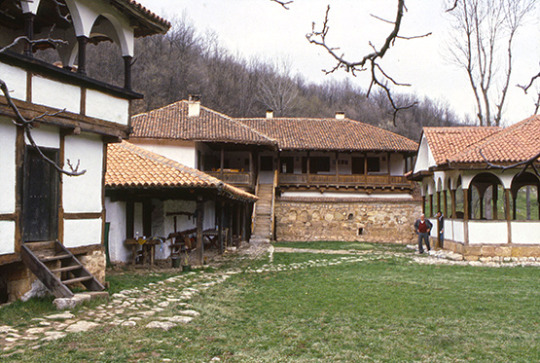
Konak and Church Porch at Monastery of Saint John
Poganovo, Serbia
Beyond the čardak at left are a single story building, a two-story konak (residence), and the entrance porch of the church. Together they frame the small churchyard on three sides. (A wall with entry gate surrounds the entire church complex.) These building types, materials, and construction techniques were common in the 19th century in Eastern Serbia. A museum site during the communist era, the monastery was returned to the Orthodox Church after 1990.
(photo 1988)
9 notes
·
View notes
Text
With the USSR, it was even easier to find a pretext for belligerence. Here was an empire of self-evident evil, and an atheist one at that. Its collapse created a gaping void for US grand strategists, who couldn’t help displaying a certain blasphemous nostalgia for their communist adversary. Just look at the names affixed to American military operations overseas. During the Cold War these were banal and arbitrary: the terrorist campaign against Castro’s Cuba was called Operation Mongoose; the mission to torture and assassinate members of the Vietcong was known as Program Phoenix; the bombardment of Cambodia, Operation Menu; Nickel Grass denoted the airborne delivery of arms to Israel during the Yom Kippur War; Praying Mantis the attack on Iran in 1988. Yet the register changed after the fall of the Wall. The 1989 invasion of Panama, Operation Just Cause, marked a new grandiloquence. In 1991, as the USSR crumbled, the US embarked on mission Restore Hope in Somalia, while Haiti saw the pinnacle of this Orwellian newspeak with operation Uphold Democracy in 1994. There followed Joint Endeavour in Bosnia (1995), Enduring Freedom in Afghanistan (2001), Iraqi Freedom (2003), and the classicizing Odyssey Dawn in Libya (2011).
If warfare in the communist era had a religious valence, in the post-communist world it became a question of morality – of humanity. We no longer speak of an Evil Empire but of ‘rogue states’. The enemy is to us what the criminal and gunslinger is to the sheriff. When we talk of ‘outlaw’ nations we embark, à la Carl Schmitt, on a ‘conceptual construction of penal-criminalistic nature proper to international law’: ‘the discriminatory concept of the enemy as a criminal and the attendant implication of justa causa run parallel to the intensification of the means of destruction and the disorientation of the theaters of war’.
Elsewhere, Schmitt notes that ‘to confiscate the word humanity, to invoke and monopolize such a term probably has certain incalculable effects, such as denying the enemy the quality of being human and declaring him to be an outlaw of humanity; and a war can thereby be driven to the most extreme inhumanity’. As we edge, like sleepwalkers, closer to the abyss of nuclear war, one can’t help recalling the words of the Nazi jurist (who didn’t seem to realise he was also talking about his own regime): ‘weapons of absolute annihilation . . . require an absolute enemy, lest they should be absolutely inhuman’.
The contemporary period, then, is marked by a yearning for the Crusades. But in European public opinion one can sense a certain apathy, a lukewarm resignation if not thinly-veiled scepticism: the kind one feels when watching a film one’s seen too many times. The media still denounces Putin’s atrocities and makes obligatory comparisons with the Hitlers and Stalins of the past, yet it does so with the enthusiasm of a bored schoolchild, almost as if le coeur n’y était pas. How many times have we woken up to the news that our former allies have suddenly become reprobates and criminals? How can we forget that Saddam Hussein was furnished with chemical weapons to use against Iran before he was designated a war criminal himself? Or that Bashar al-Assad was deemed reliable enough to torture prisoners at the behest of the CIA before he became a so-called international pariah?
It also strains credulity that the US wants to see alleged war criminals tried in an international tribunal which it does not even recognise; that it supports Israel’s illegal occupation and apartheid regime but refuses to tolerate Russia’s presence in Crimea and the Donbas; that it recognises the ethno-territorial grievances of Kosovar minorities in Serbia but not those of the Russophone minority in Ukraine, and so on. How can we take seriously the West’s invectives against authoritarian regimes, and calls to defend democracy, when our democratic leaders lay out the red carpet for a Saudi Prince who butchers critical journalists and an Egyptian General who executes political prisoners by the tens of thousands?
4 notes
·
View notes
Text
a meditation on my past three or so identity crises and vampire weekend's new album
i have been listening to vampire weekend for roughly 15 years (i am 25). i am third-generation croatian great famine irish co-opting italian americanness by way of childhood experience and ex roman catholicism. born and raised in jersey. elementary school bullies were generationally wealthy irish or italian kids. family trees of traitors, all of us. i was briefly obsessed with finding some sort of ancestral connection but i think whenever that impulse happens for white usamericans it’s misplaced. surely there’s goodness here! surely there’s shared struggle! surely one of you was a communist! but now i’m over it. whatever they’re dead i’m alive i’ll do it. my mother has dubbed me the family catalyst. the thing about being a catalyst is you have to set yourself on fire and burn away to fuel everyone else's fire.
my first encounter with vampire weekend was in 2007? 2008? (whenever they released their first self titled album). starbucks used to do this free song pick of week thing where they’d give you a card with your coffee order that let you download a song from itunes for free, and my dad got them sometimes on his way to work. we got cape cod kwassa kwassa that way, and i found it in the family library and put it on my little purple ipod shuffle.
modern vampires of the city was released in 2013, and the first vampire weekend album i actually consciously sunk my teeth into the content of (lyrics, musicality, visuals). i think i got to it a year late, i wasn’t plugged into music release social media campaigns back then. i was 15 or 16. in 2014 i read the communist manifesto for the first time and told my teacher it sounded pretty good, and she told me it only worked on paper. i read it for a european history class which required i shove 700 years of history into my brain for an exam i then proceeded to fail. i'm “bad” at school but i built invaluable critical thinking and analysis skills from that class. and a disgust with enlightenment era philosophers. that part wasn't on my teachers list i don't think. that class had 9 people total in it, 2 of which were transfer students (and also my friends) from europe (one from belgium, one from albania). in that class i learned i was supposed to have feelings about serbia, bc of my very croatian last name, but i didn't. my family doesn't talk to each other like that, about real things. my reaction to finding out there were divisive wars in living memory involving part of my identity was to try and learn about yugoslavia on my own, not knowing that anything i got my hands on was filtered through lenses of anti communism and red scare sentiment. the yugoslav wars happened after my nono (grandfather) left, and ended when i was very very young. according to my mother though, he always had something to blame on the serbs. then it was jews. then the government. then hospitals. then my nona (grandmother). then my mother. now my dad.
/you talk of serbians, whisper kosovar albanians/
/the boy’s romanian, third generation transylvanian/
/i see vampires walkin, don't be gripped by fear, you aren’t next/
/we’re all the sons and daughters of vampires who drained the old world’s necks/
in 2014 i went to croatia for the first (and probably last, given my finances) time and met my extended family there. on that trip i looped modern vampires of the city every day, both because i love that album and because i did not have internet access or cell service. two weeks on a farm on an island off the coast of croatia, with only my family. a teenager’s dream! i did really enjoy it though. i found it grounding to be living amongst memories of centuries before me. both architecturally, the buildings are older there than the united states (government) itself, but also in my ancestors' memories. i stayed in the house my nono grew up in, and the house that’s been in my family name for centuries. the house was built before the empire rose and still stands there today despite its inhabitants dead or emigrated. the us empire rose on the bones and blood of multiple civilizations, specifically and purposefully wiping them out and creating that cognitive dissonance i was facing for the first time as a teenager.
/in times of war the educated class knew what to do/
/the temple’s gone but still a single column stands today/
/that sinking feeling fades but never really goes away/
/a staircase up to nothingness inside your dna/
/well thats a bleak sunrise/
/i know what lies beneath manhattan/
/i know who's buried in grants tomb/
age 16, for anyone i think, is the peak of arguing with your parents. age 16 is the culmination of anger about not having agency over your own life . 16 is crying and screaming and fighting your patriarchal family, thinking if you can just explain things right you can undo generations of behavioral patterns and beliefs. 16 is for fighting your father and reading queer lit on the family shared kindle account. and diane young, evidently.
in 2018 and 2019 i spent my summers in my professor’s studios (one in queens, the other in brooklyn) working for unpaid college credit as a studio assistant. i lost my wallet in brooklyn. i spent hours in the new york public library archives sifting through images of the city during the 70s and 80s for research. i took greyhound buses from south jersey/south philly to penn station. i ate lunch in battery park in the rain, cried in bathroom stalls, and scrambled around mta carrying too much shit.
/used to have a job at penn station/
(cue what sounds like the shrieking noise of a train coming in, what commuters blink at and tourists recoil from)
in 2019 father of the bride came out, about a month before i became chronically ill/disabled. i was supposed to see that tour. at the beginning of 2020, my final semester of college, i went on medical leave and moved back in with my parents (something i vowed to never do and something my therapist at the time strongly suggested i never do. life goes on.)
2024. only god was above us. i will turn 26 in a couple months. this year my childhood dog died. i read state and revolution (lenin). i organized phone calls with my grandfather to learn about his life in croatia (and distract him from recovery from back surgery) (and give my grandmother a break). everyone’s forgotten about covid or actively doesn’t care. but everyone keeps getting sick isn’t that so strange. the weather is a trapeze artist but your average conversation regards it as strange this year, and nothing deeper. my grandfather disowned my father in a bout of rage last month. i keep collecting comorbidities like painful trinkets. my mother emailed me a list of things to write a book about, which reads more like questions she’s been meaning to ask me about my life. i have no interest in cracking open my ribcage so blatantly in something longer than an essay or blog post. i will pour myself into art and fiction and you can take what meanings and interpretations from it as you will. one of my favorite things about creating art is what people find in it afterward. this thing that was an expression, a release for me, has hidden meanings and images to other people that i will never predict and that’s absolutely thrilling to me. sometimes people ask me what things are in my drawings and i ask them what they think it is and it frustrates them to no avail. my mom found a jaguar in this drawing and i cheered but refused to confirm or deny. (after that i called the piece jungle, but it certainly never started that way. i’m not even sure if jaguar is the right cat. the spotted one? but not a cheetah.)
i journey into only god was above us carrying the weight of cycles and behaviors, patriarchal abuse, research on the balkans, lenin on the brain, thinking about covid and palestine and sudan and every other nation the country i live in steps on the neck of and who’s blood has benefitted me in some way. my own madness, my sickness, my rage. ill mad and angry. genetic health conditions, family curses. writing a sci-fi something. thinking about the deep sea internet cables and growing up on the internet.
/the oceans churning, the cables stay in place/
coming from generations of mechanics and farmers and restaurant staff. stuck alone with my parents in the woods of south jersey. missing commute times and the clogged holland tunnel. dealing with multiple chronic conditions that render me at the mercy of corrupt broken state institutions, jumping through administrative hurdles to get care. facing eugenic and bioessentialist thought in every person i meet. wishing i could live elsewhere but knowing that’s precisely what my ancestors did that got me here in the first place. and wouldn’t that be shoving myself up the ladder in some way, stepping on whoever lives wherever i would want to go. continuing the line of betrayal. i’m tired of the us empire’s tendrils poisoning the globe and i want it to fall apart desperately but i also know that as it does my health will get worse without medications and i will be useless to any movement and no movement would have me . my brain creatures whisper i am a parasite and social norms reaffirm the whispers at every turn. the ascetic creature in my brain who sits in her wading pool and passes judgement on the rest of me (and herself) while seeking absolution for everything i cannot change refuses to allow the water to flow and instead needs it to fit in her palms. what was i talking about? vampire weekend.
/your consciousness is not my problem/
/and i hope you know your brain’s not bulletproof/
(over what sounds to me like the din of squealing subway tunnels)
i have a notes app entry that’s just notes i took while listening to the album. i’ve interspersed some things in here, but here are some special mentions i can’t weave into my words, and then a whole frantic paragraph about the final song on the album because there’s a lot to talk about. time stamps included if you’re listening along at home.
capricorn: i love the discordant WEE WAW WEE WAW that dominates and sweeps through the song’s entire sound after the second verse. also /sifting thru centuries for moments of your own/ really resonated with me.
connect: lyrically this was really fun for me as someone who’s got a whole soap box notes app entry document on growing up online and the current online cultural landscape. /now is it strange i cant connect? it isn’t strange but i could check . walked around to where we kept the box of wires, and lately/ . also super thrilled about the deep sea internet cable mention in this song. and then something about the instrumental break at 3:22 reminds me of times square retail stores at christmas time. i can’t explain it.
prep school gangsters: the emphasis and repeating of /its just something people say/ at the end makes me feel like this is not actually something people say, maybe people really do feel that way .
the surfer: starts out like old school cool guy bopping down a city street, but then the second piano (a second piano has hit the-) kicks in (1:11) and suddenly it’s offputting and dreary. the extreme weather alert like siren after verse 1. /california king placed directly on the floor/ the selective luxury we all partake in as capitalism spins out around us. the line /fake fortune teller scandalized by fate/ made me think of astrology and personality quizzes and pathologization taking over the social consciousness. the stunning horns at 3:32 that make me sweep my arms around every time i hear them, the climax of a movie, the height of the wave. 3:44 the wave breaks, and we coast with just a twang of surfer rock guitar. the radio static glitchiness because we are not surfing. we are not coasting. it is falling apart, we are wiping out. we’re headed back towards the beach at the end but the stunning horns return, muted a bit as a reminder of the adrenaline at the height of the wave.
the chorus in gen x cops, /each generation makes its own apology/ half of me reads it as healing and the other half reads it as the old person's refrain of not knowing any better. a half hearted apology from a parent, a “sorry you took it that way.”
mary boone is funny because i /came in from jersey/ and did internships /the one from queens not from brooklyn/ . i also really love /im on the dark side of your room/ because it makes me imagine the young struggling artist as the rich art critic/dealer/tax evader’s sleep paralysis demon.
pravda: this one and the surfer are my favorite songs. verse 1 makes me think of when lenin was exiled for his revolutionary writings. sorry . and then something about /leaving at the rising of the moon/ and how revolutionary battles are named in history (bloody sunday for the russian revolution for example.) /your consciousness is not my problem/ thinking about your awareness of the world around you, your political consciousness, and also whether i knock you out or not. also after the lyrics mention hanging the family balalaika by the piano a little piano tinkles in and it’s fantastic. and with mentioning penn station the train squeals to arrive. to me. <3
the final song is an 8 minute long track called hope and it's so haunting and sardonic and mildly threatening i’m obsessed with it. i was nervous hearing it out of the context of the album at first because i was like god please don't be a liberal nihilism song. but i think in the context of the rest of the album, and paying attention to the words and production, the “i hope you let it go” is like . i hope you let it die. i hope you let it end. i hope you let the insincere prophecy go and move on . the call keeps coming from inside , i hope you let it go (i hope you let it ring). your enemy’s invincible, i hope you let it go Could be (and Is, by genius song annotators who i have never agreed with on a single vampire weekend song) read as the enemy is too strong, give up. but i think of it as like. let it run itself in circles, it will destroy itself. the whole verse for emphasis:
/the prophet said we’d disappear
/the prophets gone but we’re still here/
/his prophecy was insincere/
/i hope you let it go/
/the righteous rage was foolish pride/
/the conquerors did not divide
/the calls keep coming from inside/
/i hope you let it go/
when it's all over, files declassified. your bag fell on the subway tracks, i hope you let it go and leave it there. embassy abandoned, flag on the ground, painting burned, statue drowned, killer freed, court adjourned. hope betrayed, lesson learned. the instrumental break feels galvanizing. angry. i turn my chin down into a kubrick stare as those horns build and drone on through the rest of the song. the last minute/outro of the song is angry, the pictures getting distorted, the piano/guitar still drone on but a subway passes by, horn blaring, massive distortive ruckus, and then it fades. and the album is over! and you sit .
thank you for reading :) there are things i couldn’t fit in this, can you believe it? even after i did the little list coda! but those will stay in my brain’s constant conversation with itself. the creatures chatter with me as we share a drink. this by no means was an album review. maybe it could be considered a love letter but i am not particularly interested in the band’s True Intention. what you take out of art is a credit to you as much as it is to the artist i think. i don’t want to have confirmation on what art is about. do not tell me the true meaning, let me discover my own. i give what i give receive what i receive . peace n love <3
highly recommend their music videos for this album btw, they use archival footage (and images) by steven siegel and it's cool stuff
youtube
#i listened to the whole album at least 5 times while writing this#this is like. SO personal but . im gonna post it anyway#wretched text
0 notes
Text
5/25 Josip Tito
In former Yugoslavia, Josip Tito was the leader of the communist Yugoslavian state
He collaborated with several governments but maintained neutrality between the Soviet Union, America, and other countries across the world
Poor individuals often describe the communist era as being extremely beneficial, finally being able to have a house, education, medical attention, and other necessities
Wealthier individuals or those with higher degrees and property frown upon the communist era as they lost their property, saw a reduction in their incomes and experienced a higher rate of poverty
In the event of Tito's death, the world's largest funeral was held with the highest number of attendees
Gifts from across the world, leaders, governments, and people were sent in and collected at his former summer home in Serbia
Today, it is a museum where people are able to appreciate the gifts that were sent to him and their historical value
They are also able to pay their respects to his grave and his wife's grave
0 notes
Link
0 notes
Text
Three Minutes to Eternity: My ESC 250 (#30)
youtube
#30: Željko Joksimović feat. the Ad-Hoc Orchestra -- Lane Moje (Serbia and Montenegro 2004)
“Kad' na te pomislim,
Bojim se da te opet zavolim,
U modre usne zarijem zube,
Da pravu bol zaboravim...”
“When I think of you,
I'm afraid of loving you again
I sink my teeth into my blue lips
To forget the real pain.”
While the other ex-Yugoslav countries were able to debut throughout the 1990s, FR Yugoslavia (later Serbia and Montenegro) was banned from Eurovision because the UN placed sanctions on the country mere weeks after Yugoslavia's last appearance in Eurovision in 1992. It would be another twelve years before Serbia and Montenegro would return to Eurovision (which is a bit strange considering FR Yugoslavia competed in--and won--Eurobasket 1995 and would be a powerhouse in basketball in the late 1990s), in which after a wild NF process, we get Željko Joksimović and his song.
Little did they know was how much the European public would embrace the Balkan Ballad, with its traditional instrumentation and saudadic lyrics. There's a sense of re-building Serbia's image through Zeljko's appearance, but the song is enough to put you under a spell you can't get out of.
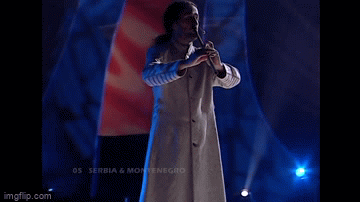
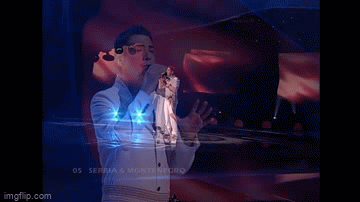
Starting with the flute intro which extends for almost a minute, it gives a sense of brooding before Zeljko enters and starts singing. Then, everything calms down with the instrumental, before increasing slightly in the first chorus. The mournful lyrics take hold into the song, though by then you feel like you're already in a sullen yet beautiful world, filled with dew-drop trees without leaves under a cool, clear day.
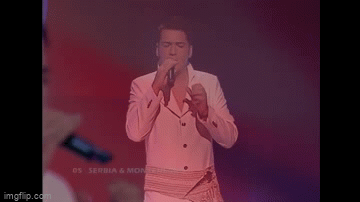
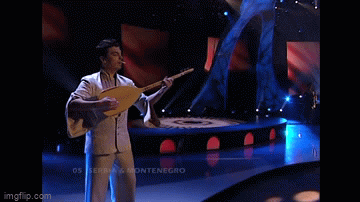
The violin bridge smoothly connects the two choruses, and the key change at the end doesn't feel forced. Instead, it feels like a climax towards the quiet pain Zeljko hides inside himself, as all the instruments come together. It's an art piece in all the right ways, and adds a good amount of quality to the lineup.
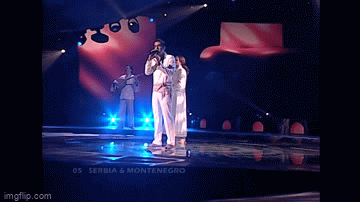
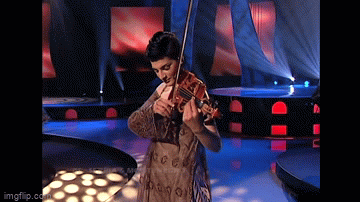
The contrast between this and Wild Dances (#41) is also quite notable: both songs showcase the two countries as more than what's seen on TV, and do a good job in hooking in the audience. But just as Wild Dances is intense, throbbing, and full-on tribal, Lane moje is low-key, sophisticated, and really tugs on the heartstrings. The latter is what made it my favorite of 2004, in that it floats above the rest of the crowd.

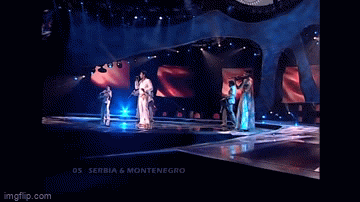
And as mentioned above, it made Balkan Ballads "cool" in Eurovision. Neka mi ne svane (#117) was the first really successful one, but there was something more in Lane Moje which kept itself in the public consciousness. Sometimes I would forget how much I love this song, but when I go through the opening, everything hurts anew.
Personal ranking: 1st/36
Actual ranking: 2nd/24 GF in Istanbul
Final Impressions of 2004: The first year of the semi-final era didn't start off on the best note. Despite the influx of new countries, the song quality was below average, and most of the songs that didn't qualify didn't deserve to (if you haven't listened to Celebrate yet, don't unless you're going through every year. It's really bad children''s music.). Nor was the production the strongest--everything felt a bit lackluster, and the sound quality wasn't the best.
Turkey intended to showcase this Eurovision as an "opening up" to the continent, as they aspired to become part of the EU. Europe opened up to some extent, in that the top three of this year hit personal bests after a short time, or in Greece's case, after almost thirty years. I think it's the best top three of this century--not only because of the song quality, but also because a showcase of this "New Europe". Greece is a little less so, because of their role in the making of Western civilization, but Serbia-Montenegro and Ukraine show off post-Communist Europe ready to take everything on.
(Also, this was the only year where my top five songs are the same as the actual top five. Yes, Sweden was joint-fifth with Cyprus, but I think Eurovision again broke the tie, haha)
#eurovision song contest#eurovision#esc250#esc 250#esc top 250#esc serbia#esc serbia and montenegro#Željko Joksimović#lane moje#esc 2004#balkan ballads#Youtube#it's so beautiful#make lane moje the esc250 winner again#because it was the last esc250 winner that wasn't euphoria#three minutes to eternity
4 notes
·
View notes
Text
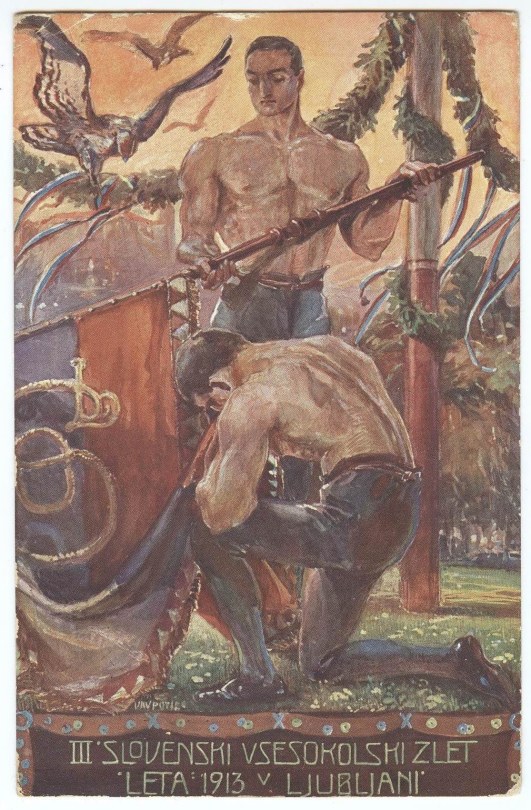
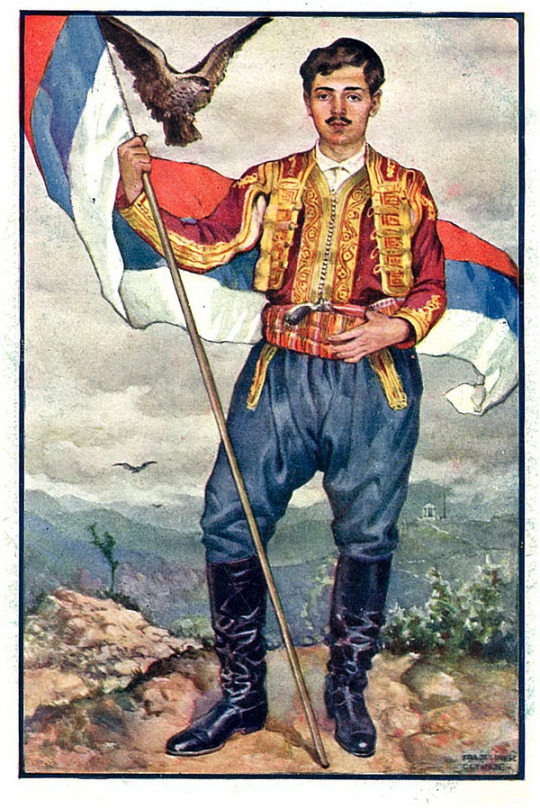
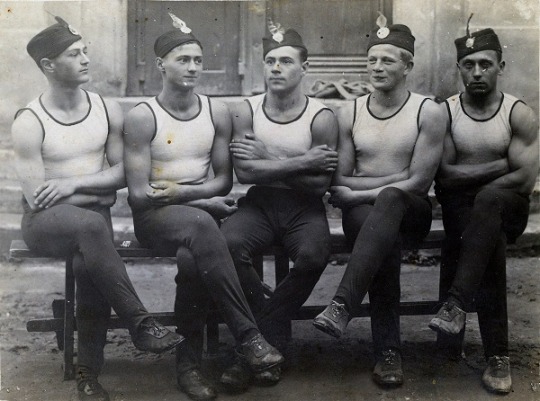
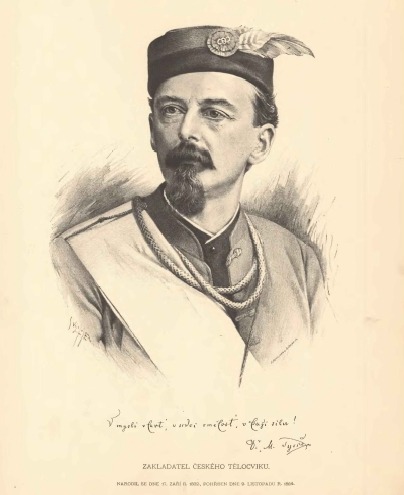
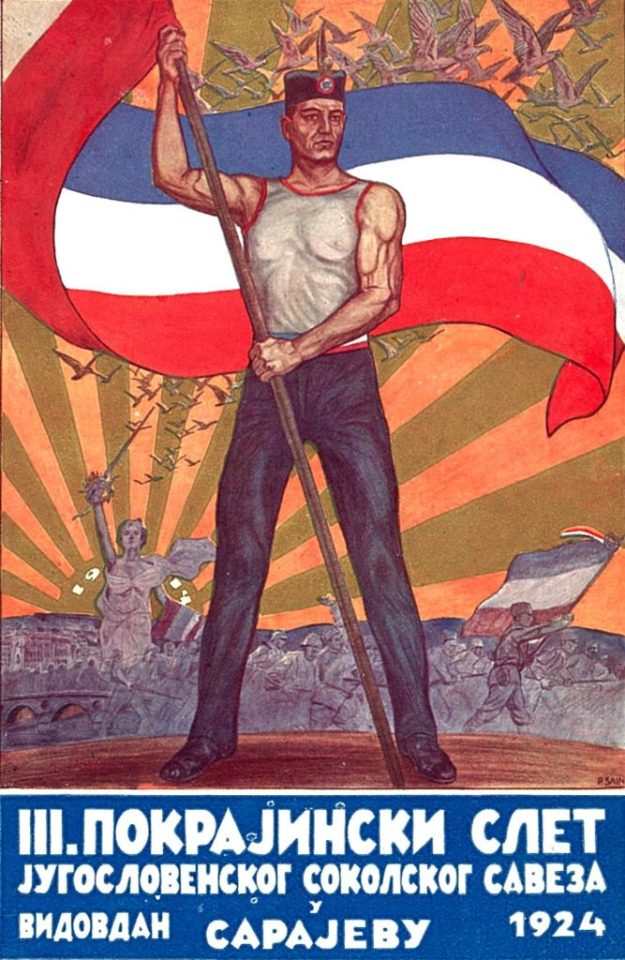
"Sokol" ("Hawk") movement was an all-age organization promoting Pan-Slavic nationalism, healthy lifestyle and physical activity. It was based upon a principle "In healthy body, a healthy mind". It was founded by Miroslav Tyrš and Jindřich Fügner. Movement has quickly spread over Slavic world with branches being started in Serbia, Russia, present day Ukraine, Belarus, Bulgaria, Croatia, etc... Initially majority of members were students and professionals but over time many people of working class joined as well. In 1882, the first "Slet" was held. Word "slet" came from Czech word "slety" meaning "a flocking of birds", and those events were mass gymnastics festival that continued even in Communist era. First "slet" ceremonies included elaborate welcoming ceremony at train station, mass demonstrations, gymnastics competition, speeches and theatrical events open to all members of Sokol movement.
35 notes
·
View notes
Photo
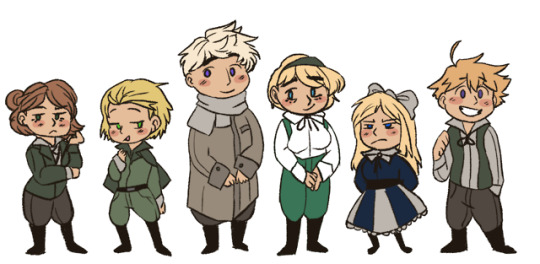
Ask box is now open!
I wanted to draw the rest of the Slavs like Bulgaria Serbia etc but I was just,,, super tired lmao, but I'll draw them next time!!
My versions of these characters are slightly tweaked from Hetalia canon?? not super much but I just implemented some of my hcs, which hopefully I'll get to explore through the ask blog!
ANYWAY, MOST IMPORTANT INFO:
Czechia: She is the ‘older’ sister of Poland and aside from Ukraine, the most responsible of the bunch, at least, she looks like it. She always puts up a very serious and professional demeanor but in actuality shes chaotic like her siblings and loves to hang out with them and do stupid things, but she would never admit it, because she has worked very hard for what she has now and doesn't want to lose that respect due to fooling around too much.
Poland: He is basically the same as in canon bUT much more depressed lmao. Dude doesn't sleep much and even though he hides it well, he's a really sad dude and still bitter about a lot of things, but he plays it off cause “its, like, totally fine!” Also, his hair is shorter because I hc that all the satellite states and USSR countries had their hair cut during the communist era, so his hair is still growing back, same with Czechia and the rest of the squad.
Russia: Russia is also pretty much the same as in canon but... sad lmao. He is trying to turn a new leaf but it's hard because of all that has happened in the past, but he acts like it doesn't bother him at all. He has pretty tense relationships with all of his family though, and that makes him quite lonely, but he doesn't want to show it, and all the Slavs are pretty good at hiding their true emotions.
Ukraine: She is the mom of the group and deserves rest!!! Shes basically just as in canon, she is sweet and kind and loving and is basically the eldest and takes care of everyone, but she's also very tired, often feeling that her siblings use her kindness against her to use her. She worries about it, but her family means the world to her, so she just tries her best to deal with whatever comes her way.
Belarus: Just like in canon she is kinda scary and clings to Russia but... not in a psycho way?? Like there's more to her than just being obsessed with Russia. She is quieter and more into herself than the rest, and much more visibly aggressive when something ticks her off. She loves her family very dearly though, especially Russia, but is just very bitter and also just... a more solitary country than the rest and that's fine! They all love her and don't push her to act any certain way.
Slovakia: He s the youngest of this group but not by much. He is quite laid back and has become Poland and Czechia's brother over time (I might explain how I hc family relationships and how they form between countries in another post). He is quite laid back and enjoys playing pranks on the other countries, enjoying his time as his own country after being with Czechia for so long in his life, and he uses that independence to have fun and chill out!
I wanna develop them further ofc and stuff but I'm just really excited to hopefully do some stuff with them cause I really love the Hetalia Slavs and think they deserve way more and are really fun to play around with! Sooo yeah ask box is open and ready for use! <3
#hetalia#aph#hws#hws russia#hws poland#hws czechia#hws slovakia#hws ukraine#hws belarus#hws slavs#hws slavics#aph russia#aph poland#aph czechia#aph slovakia#aph ukraine#aph belarus#aph slavs#aph slavics
260 notes
·
View notes
Text
Headlines
Exhausted cities face another challenge: a surge in violence
(AP) Still reeling from the coronavirus pandemic and street protests over the police killing of George Floyd, exhausted cities around the nation are facing yet another challenge: a surge in shootings that has left dozens dead, including young children. The spike defies easy explanation, experts say, pointing to the toxic mix of issues facing America in 2020: an unemployment rate not seen in a generation, a pandemic that has killed more than 130,000 people, stay-at-home orders, rising anger over police brutality, intense stress, even the weather. “I think it’s just a perfect storm of distress in America,” said Atlanta Mayor Keisha Lance Bottoms after a weekend of bloodshed in her city. Jerry Ratcliffe, a Temple University criminal justice professor and host of the “Reducing Crime” podcast, put it more bluntly: “Anybody who thinks they can disentangle all of this probably doesn’t know what they’re talking about.” Through Sunday, shootings in New York City were up more than 53%—to 585—so far this year. In Dallas, violent crime increased more than 14% from April to June. In Philadelphia, homicides were up 20% for the week ending July 5 over last year at this time. In Atlanta, 31 people were shot over the weekend, five fatally, compared with seven shootings and one killing over the same week in 2019.
Congress created virus aid, then reaped the benefits
(AP) At least a dozen lawmakers have ties to organizations that received federal coronavirus aid, according to newly released government data, highlighting how Washington insiders were both author and beneficiary of one of the biggest government programs in U.S. history. Under pressure from Congress and outside groups, the Trump administration this week disclosed the names of some loan recipients in the $659 billion Paycheck Protection Program, launched in April to help smaller businesses keep Americans employed during the pandemic. Connections to lawmakers, and the organizations that work to influence them, were quickly apparent. Members of Congress and their families are not barred from receiving loans under the PPP, and there is no evidence they received special treatment. Hundreds of millions of dollars also flowed to political consultants, opposition research shops, law firms, advocacy organizations and trade associations whose work is based around influencing government and politics. While voting, lobbying and ultimately benefiting from legislation aren’t illegal, advocates say the blurred lines risk eroding public trust in the federal pandemic response. “It certainly looks bad and smells bad,” said Aaron Scherb, a spokesperson for Common Cause, a watchdog group that was also approved for a loan through the program.
Missouri summer camp virus outbreak raises safety questions
(AP) Missouri leaders knew the risk of convening thousands of kids at summer camps across the state during a pandemic, the state’s top health official said, and insisted that camp organizers have plans in place to keep an outbreak from happening. The outbreak happened anyway. An overnight summer camp in rural southwestern Missouri has seen scores of campers, counselors and staff infected with the coronavirus, the local health department revealed this week, raising questions about the ability to keep kids safe at what is a rite of childhood for many. The Kanakuk camp near Branson ended up sending its teenage campers home. On Friday, the local health department announced 49 positive cases of the COVID-19 virus at the camp. By Monday, the number had jumped to 82.
Our Cash-Free Future Is Getting Closer
(NYT) PARIS—On a typical Sunday, patrons at Julien Cornu’s cheese shop used to load up on Camembert and chèvre for the week, with about half the customers digging into their pockets for euro notes and coins. But in the era of the coronavirus, cash is no longer à la mode at La Fromagerie, as social distancing requirements and concerns over hygiene prompt nearly everyone who walks through his door to pay with plastic. “People are using cards and contactless payments because they don’t want to have to touch anything,” said Mr. Cornu, as a line of mask-wearing shoppers stood three feet apart before approaching the register and swiping contactless cards over a reader. While cash is still accepted, even older shoppers—his toughest clientele when it comes to adopting digital habits—are voluntarily making the switch. Cash was already being edged out in many countries as urban consumers paid increasingly with apps and cards for even the smallest purchases. But the coronavirus is accelerating a shift toward a cashless future. Fears over transmission of the disease have compelled consumers to rethink how they shop and pay.
The White House and AMLO
(Foreign Policy) Mexican President Andrés Manuel López Obrador visits the White House today (Wednesday) for his first foreign trip since winning the presidency in 2018. His arrival in Washington on Tuesday evening was typically on-brand for the leftist leader: He flew in economy class on a commercial airliner (albeit in an exit row). Unlike Canadian Prime Minister Justin Trudeau—who spurned an invite to today’s meeting as the U.S. government threatens to place tariffs on Canadian aluminum—this summit is too good an opportunity for López Obrador to turn down. That’s largely because of the importance of the United States to Mexico’s economy—which is predicted to contract by 10.5 percent this year, according to the International Monetary Fund. As his approval rating gradually falls along with Mexico’s economic performance, López Obrador is aiming to stay on Trump’s good side. “This is about the economy, it’s about jobs, it’s about well-being,” López Obrador said before he departed for Washington.
Berlin looks east
(Foreign Policy) Germany is hoping to strengthen its economic ties with China, setting itself apart from the rest of the West and the United States in particular. Germany’s relationship with China has always been divided. On one hand, human rights issues preoccupy the German public, and figures such as Ai Weiwei and Liao Yiwu are well known there. But on the other, trade between China and Germany is significant and largely responsible for Germany’s post-2008 prosperity. The antagonism shown by President Donald Trump and his team toward German Chancellor Angela Merkel has also poisoned any attempts by the United States to sell Berlin on a split with Beijing.
OECD unemployment rate to hit record highs
(Foreign Policy) The world’s wealthiest countries will see record unemployment rates as a result of the coronavirus pandemic, according to the Organization for Economic Cooperation and Development (OECD). The OECD forecast a 9.4 percent unemployment rate across the 37 countries that make up the group’s membership, a number that could go as high as 12.6 percent if these countries see a second wave of coronavirus cases. In releasing the data, OECD Secretary-General Angel Gurría called on wealthy countries to better protect the economically vulnerable across their societies. “In times of crisis, ‘normality’ sounds very appealing. However, our normal was not good enough for the many people with no or precarious jobs, bad working conditions, income insecurity, and limits on their ambitions,” Gurría said.
Rioting in Serbia
(Reuters) Dozens of demonstrators and police were injured in overnight rioting in Belgrade, triggered when a crowd stormed Serbia’s parliament in protest at plans to reimpose a lockdown following a surge in coronavirus cases. Footage showed police kicking and beating people with truncheons while protesters pelted officers with stones and bottles, after thousands chanting for the resignation of President Aleksandar Vucic gathered outside the building. Vucic announced the new lockdown on Tuesday, saying it was needed because of the rising number of coronavirus cases.
Top U.S. general speaks on Russian bounty case
(Foreign Policy) Gen. Frank McKenzie, the head of U.S. Central Command, has poured cold water on recent allegations, first reported by the New York Times, of a program run by Russian intelligence offering cash to Afghan militants for killing U.S. soldiers. McKenzie called the reports “very worrisome,” but said he couldn’t point to any U.S. casualties that could have had a direct link to the alleged program. McKenzie said that Russia’s actions in Afghanistan should, however, still be watched closely.
Japan battered by more heavy rain, floods; 58 dead
(AP) Pounding rain that already caused deadly floods in southern Japan was moving northeast Wednesday, battering large areas of Japan’s main island, swelling more rivers, triggering mudslides and destroying houses and roads. At least 58 people died in several days of flooding. Parts of Nagano and Gifu, including areas known for scenic mountain trails and hot springs, were flooded by massive downpours.
‘We’re next’: Hong Kong security law sends chills through Taiwan
(AFP) The imposition of a sweeping national security law on Hong Kong has sent chills through Taiwan, deepening fears that Beijing will focus next on seizing the democratic self-ruled island. China and Taiwan split in 1949 after nationalist forces lost a civil war to Mao Zedong’s communists, fleeing to the island which Beijing has since vowed to seize one day, by force if necessary. Over the years China has used a mixture of threats and inducements, including a promise Taiwan could have the “One Country, Two Systems” model that governs Hong Kong, supposedly guaranteeing key civil liberties and a degree of autonomy for 50 years after the city’s 1997 handover. Both Taiwan’s two largest political parties long ago rejected the offer, and the new security law has incinerated what little remaining faith many Taiwanese may have had in Beijing’s outreach. Some now fear even transiting through Hong Kong, worried that their social media profiles could see them open to prosecution under the legislation.
Millions of Australians brace for lockdowns amid Melbourne virus outbreak
(Reuters) Five million Australians face a heavy police clampdown from midnight on Wednesday to contain a flare-up of coronavirus cases, with checkpoints to be set up around Melbourne to ensure people stay at home.
Suleimani killing “unlawful”
(Foreign Policy) In a new report, Agnès Callamard, the U.N. special rapporteur on extrajudicial, summary or arbitrary executions, concluded that the January killing of Iranian Commander Qassem Suleimani by a U.S. drone strike was arbitrary and unlawful under international human rights law, citing a lack of any imminent threat posed by Suleimani in the lead up to the assassination. Callamard will present her findings to the U.N. Human Rights Council on Thursday. The United States left the council in 2018.
Rising food prices in Lebanon
(Worldcrunch) In Lebanon, the constant change of the dollar exchange rate and a plummeting Lebanese pound have led to a 190% increase in food prices within a year. Hit with exponential inflation, French daily Les Echos notes that the country is facing its most serious economic and currency crisis since the end of its 1975-1990 civil war.
Dozen of bodies found in Burkina Faso, and rights group suspects extrajudicial killings
(Reuters) At least 180 bodies have been found in common graves in Djibo, a town in the north of Burkina Faso, Human Rights Watch (HRW), said in a report released on Wednesday, saying that the killings were likely carried out by government forces.
5 notes
·
View notes
Text
Moldova on Sunday marked the 15th anniversary of the so-called “Twitter Revolution” when the Communist regime of former president Vladimir Voronin was overthrown by mainly youthful protesters in Chisinau.
The Moldovan Presidency opened a photo exhibition featuring pictures of youngsters protesting against the then Soviet-type Communist leadership.
The name “Twitter Revolution” comes from the way messages in support of the protests were spread through Yahoo Messenger on the internet.
International media later named the protests the “Twitter Revolution”. It was the first time such protests had gone viral on social media. The so-called “Arab Spring” followed a few years later.
President Maia Sandu said the date April 7, 2009 remained an unhealed wound, recalling “the consequences of an authoritarian regime that imprisoned young people who think freely and which wanted to govern through fear, and feared its citizens.
“The young people who rose on April 7, 2009, suffered from the violence and terror of a regime that treated its citizens as enemies. The young people certainly experienced disappointments, but no one managed to destroy their dignity and moral strength to face injustice,” Sandu said on Sunday on her Facebook page.
However, Moldova’s former pro-Russian president, Igor Dodon, recalled the events with a lot less enthusiasm. Then part of the Communist Party, he declared that the uprising of April 7, 2009 had resulted in Moldopva becoming “a colony”.
“After 15 years, we still have a lot of misery, lies, migration … high prices, the transformation of the country into a foreign colony and a dictatorship that Voronin never dreamed of,” Dodon said on Sunday on his Facebook page.
The protests of April 7 2009 followed claims that the Communist Party had rigged the elections of April 5 2009, winning 60 seats out of 101.
The protest gathered thousands of young people in the centre of Chisinau demanding a more European future for Moldova. The then ruling Communist Party saw the country’s development as matching the Russian Federation.
The demonstrations in Chisinau were initially peaceful but took a violent turn when the protesters entered the parliament and presidency buildings and all but wrecked them.
The Communist leadership claimed that it was a coup orchestrated by the Western powers with the help of special services from Romania and Serbia.
The night after the protests, hundreds of young people were detained, tried and mistreated on the streets or in police stations. At least one young man, Valeriu Boboc, died.
Courts did little to bring offenders to justice. Ion Perju, a former policeman sentenced to prison for the murder of Valeriu Boboc, is still missing and was one of the few convicted for these violent acts. Perju has been wanted internationally since April 2015.
Alexandru Tanase, former Minister of Justice and former president of the Moldovan Constitutional Court, told the Ziarul de Garda newspaper on Sunday that the Twitter Revolution had lasting effects on Moldovan society whose importance cannot be underestimated.
“The Twitter revolution consigned to history an anachronistic government that claimed its identity in Soviet ideology, with which the construction of an independent state was unthinkable. The power that took over in 2009 was the first to change direction from East to West, radically.,” he said. “The first bricks in the foundation of Moldova’s orientation towards the European value space were built then,” he concluded.
2 notes
·
View notes
Photo
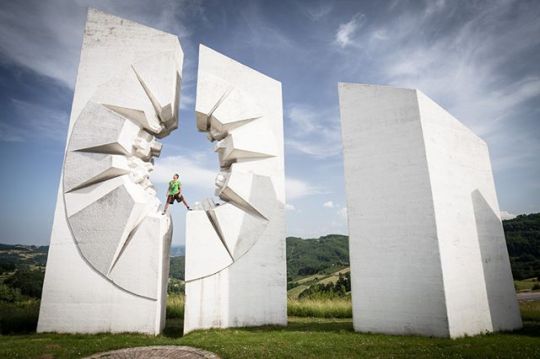
On Wednesday night, I spent the best part of an hour chatting to @stevebrazill for the @behindtheshottv podcast about one of the images I shot at the Kadinjača Memorial Complex in Serbia. This was very much a collaborative process with @boki_pk, exploring communist-era monuments scattered across Former Yugoslavia. Trying to present one monument is hard, never mind just one image from the time that we spent on the hills above Užice. Head to blog.andyday.com if you want to learn about what these incredible structures are about. . #spomenik #yugoslavia #kadinjaca #kadinjača #serbia #srbija #exploreeverything #roam247 #heatercentral #passionpassport #climbeverything #monument #communism #way2ill #archiporn #architecturelovers #modernism #socialistmodernism #brutalism #brutal_architecture #sculpture #publicart #balkans #balkancollective — view on Instagram https://ift.tt/2yK09j0
3 notes
·
View notes
Photo



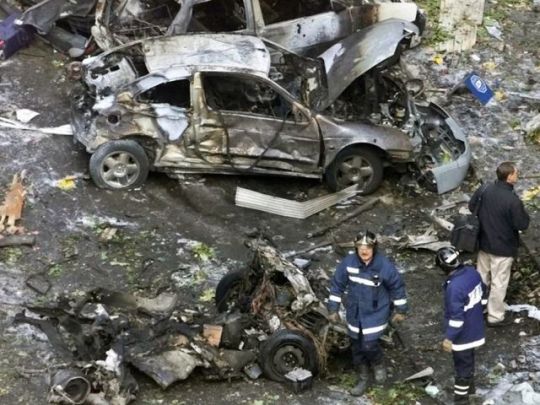
Grim History
ETA and the Violence of Basque Nationalism in Spain
The Basque country straddles the border between northwest Spain and southwest France. The people living there comprise their own ethnic group; not speaking Spanish, Catalan or French, the Basque people speak Euskadi, a language not belonging to the Indo-European language group. They have inhabited that land from a time long before the Latin speaking Romans conquered that corner of Europe. By the mid-twentieth century, some Basque people decided it was time to be their own nation. That is when ETA was born.
In the 1950s the Spanish fascist dictatorship of Franco was still strong. The battles of the two world wars had resulted in a re-structuring of the European map. The communists had ascended and Third World national liberation movements had brought about new countries in the former colonies. During that decade a group of students grew frustrated by the slow and moderate pace of the Basque Nationalist Party; decidedly taking a more hardline and revolutionary stance, they formed the Euskadi Ta Askatasuna or Basque Homeland Party, better known internationally by their acronym ETA. Organized in a loosely connected constellation of secret hideouts, headquarters, underground bunkers, and clandestine prisons scattered throughout the Basque region on the southern side of the Spanish Border, they collected weapons and plotted to bomb their way to independence in a long campaign of terrorist attacks. ETA merged with Batasuna, a Basque nationalist political party who soon became their political wing, though some Batasuna members, disgusted by ETA’s violent tactics maintain the idea that ETA used threats and intimidation to incorporate them into their terrorist movement. While ETA mostly operated on the Spanish side of the border, their political leaders directed operations from the French side and rank and file members also laid low in France when the police were searching for them. France tolerated ETA’s presence during the Franco years, hoping that their activism would help to destabilize the fascist regime.
ETA held several conferences in the 1960s and officially declared independence from Spain in 1962. Their first act of violence occurred in 1968 when a Spanish member of the Guardia Civil opened fire on an ETA member named Txabi Etxebarrieta who fled from a police roadblock. He was chased and killed and ETA decided to retaliate by assassinating Meliton Manzanas, chief of the secret police in San Sebastian. This incident initiated several waves of kidnappings and terrorist attacks.
One of ETA’s most notorious bombings was Operation Ogro in December 1973. They targeted Admiral Luis Carrero Blanco, the man chosen by Franco to be his successor. ETA packed a large bunch of explosives onto the ceiling of tunnel in Madrid which Blanco was known to drive over every day. Upon detonation, the bomb blew his car five stories into the air and over a fence where it landed in a residential back yard. Needless to say, Blanco did not survive. After ETA claimed responsibility, some people in Spain hailed ETA for an event that could have been the beginning of the end of fascism in Spain and an initiation into the era of democracy.
While ETA’s star was rising, the newly emerging democratic government decided to rely on old methods in an attempt to keep them in check. The politicians set up a paramilitary organization called the Antiterrorist Liberation Group or GAL. This groups spent the better part of the 1980s engaging ETA in extra-legal warfare, arrests, harassment, and violence. Given free reign, interrogation and torture of ETA members became routine. Assassinations of suspected Basque separatists were carried out. The Spanish secret service provided the intelligence and logistical support that were necessary for these operations. The international community responded by condemning GAL’s tactics so loudly that they eventually had to disband and halted their surveillance.
Meanwhile, ETA was also declining in popularity. Basque nationalists regarded them with lukewarm sympathy. Political parties avoided them. The majority of ethnic Basque people actually saw no benefit to liberating their people from Spain or France anyhow. A series of car bombings during the 1980s did not help their public image at all. Their worst attack occurred in Barcelona when several families were blown up in an attack on a shopping mall; in an attempt to be fair, ETA had issued a warning to evacuate the building but the citizens did not have enough time to flee. The Spanish police claimed the instructions given by ETA were unclear and confusing. Then, after the murder of a woman who had defected from ETA to return to a normal life and start a family, anti-ETA protests began to erupt in the Basque region itself. ETA soon after declared a ceasefire but it probably was too little too late; the Basque separatist cause was tainted.
The 1990s saw a new era for ETA and, some would say, new lows as well. The three top leaders of ETA declared a new ceasefire, came out of hiding, and resigned from any future revolutionary activity. The ceasefire lasted less than two weeks. An ETA sponsored organization of adolescents called the Y Group emerged. The older members of the terrorist organization were mostly in prison, so activities were turned over to this gang of young street thugs who went on a rampage of bombings, arson, rioting, and fighting police with Molotov cocktails. After some larger, and more serious attempts to disrupt the lives of the Spanish citizens, ETA kidnapped a politician named Miguel Angel Blanco. They claimed they would kill him if their demands to have all imprisoned ETA members turned over to prisons in the Basque region were not met. The Spanish government refused to negotiate with them and soon they found the politician’s dead body perforated with gun shot wounds. The public outcry, both Spanish and Basque, was loud and ETA sunk even further into unpopularity.
After the turn of the century, ETA increased their number of bombings attacks. Some were deadly but many of them failed. The war in Yugoslavia and Kosovo’s movement to break free from Serbia inspired new enthusiasm for the Basque cause but the September 11 Al Qaeda attacks on New York City made terrorists look less like legitimate freedom fighters and more like a menace. ETA’s support continued to wane. In 2006, after negotiating with the Spanish government, ETA declared a permanent ceasefire and a turn to non-violent, democratic politics; the peace did not last for more than a couple weeks. A van bombing in an airport that killed two people renewed their lust for for violent revolution.
In 2011, ETA declared a ceasefire yet again with a call to end all terrorist activities but this was met with suspicion by the general public. Some ETA members continued to call for armed confrontation but little of anything happened.
Finally in 2018, after close to 900 people had died in their terrorist attacks over a period of 50 years, ETA announced to the media their final disbandment and dissolution. ETA supposedly exists no more. Many people still remain unconvinced. With the initiation of the Catalan independence movement, many fear that the violent Basque separatists might just be waiting for a more opportune time to re-emerge.
Judt, Tony. Postwar: A History of Europe Since 1945. Penguin Books, 2006.
https://grimhistory.blogspot.com/
6 notes
·
View notes
Photo
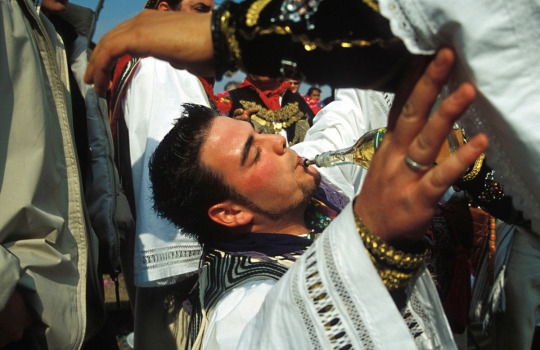
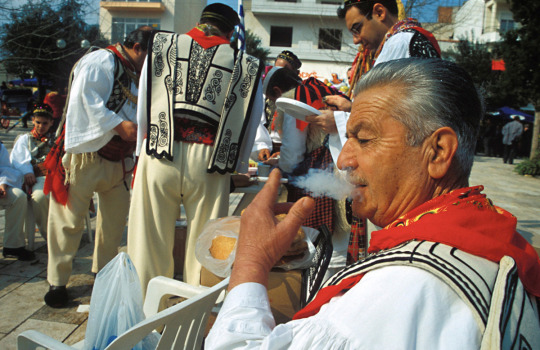
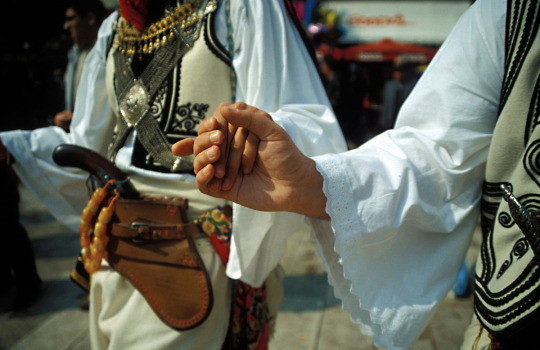
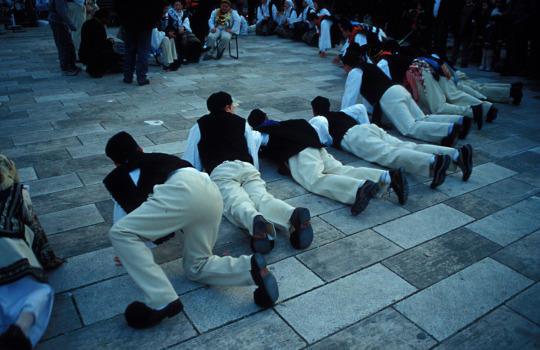
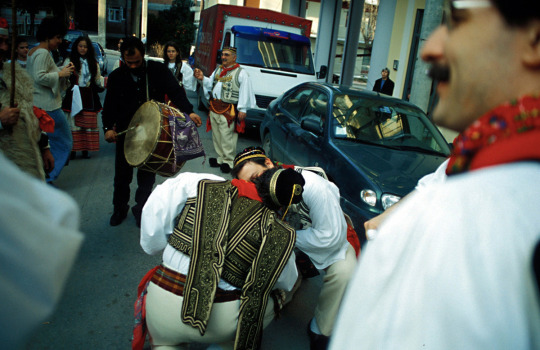
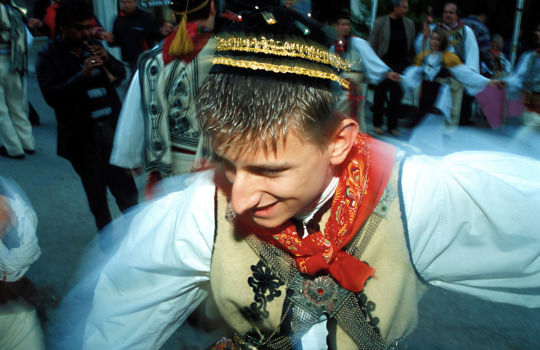
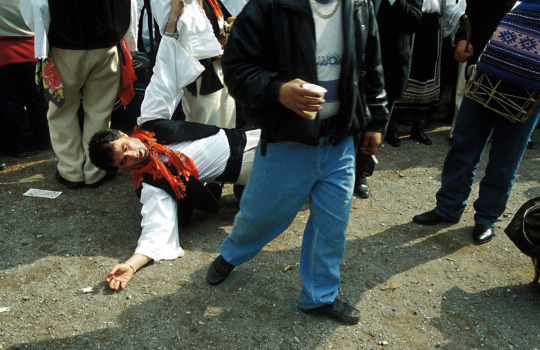
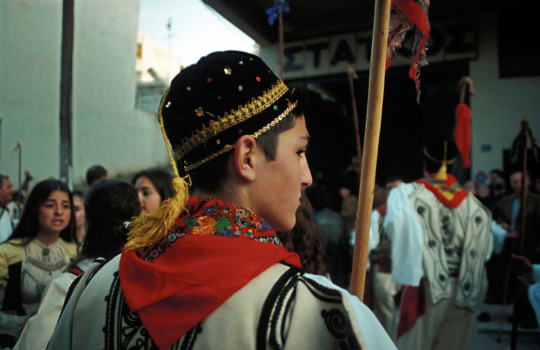
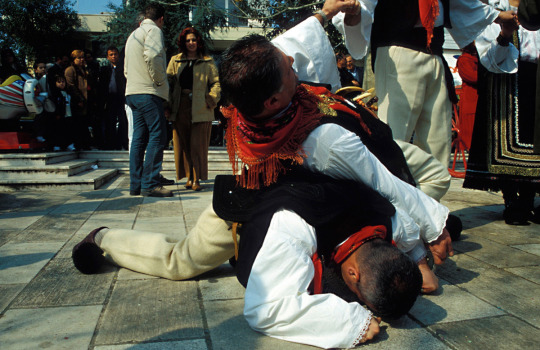
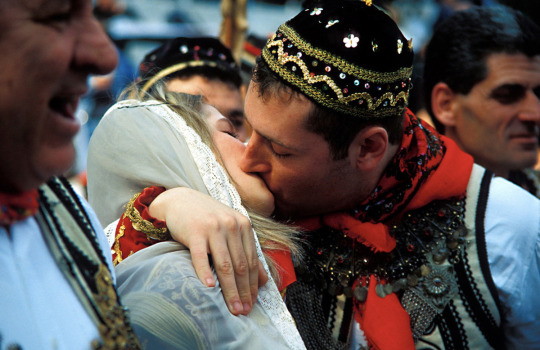
The Vlachs and their descendants in Eastern Europe
Although the Vlachs are not a Slavic people, they have a unique position of being one of the most influential non-Slavic groups throughout lands dominated by Slavs. Ranging from the highlands of Poland, Ukraine, Czech Moravia, and Slovakia all the way to the south Slavic nations of Serbia, Bulgaria, Macedonia, Croatia, and Bosnia the Vlachs have had an important impact on the genetics and cultures of certain areas in these and neighboring nations.
The term Vlach itself is an umbrella term used to describe all speakers of Eastern Latin/Romance languages, however in this context it is used to refer to those speakers of Eastern Romance languages who developed an identity and ethnic consciousness separate from modern Romanians and Moldovans such as Aromanians. They are characterized by their common origins which is that of a Latinized Paleo-Balkan people, but also by their culture and their traditional way of life as nomadic shepherds. Unfortunately, the communist era and its collectivism eventually brought an end to the traditional nomadic lifestyle of most Vlachs and their descendants on both sides of the Carpathians, making them one of the last groups of nomadic people in Europe alongside the Roma, who they share a long history of interaction and cultural exchange with.
While many of the Vlachs living in Balkan nations have managed to keep their language and distinct identity, this is not the case among those living in the northern half of the Carpathians. Although large settlements of Vlachs occured in southern Poland, South-Western Ukraine, and Slovakia; the Vlachs subsequently became Slavicized and most also adopted the Catholic faith. Eventually the descendants of these Vlachs assimilated into the same general Slavic identities as the people they lived around and mixed with, for example those in Poland came to identify themselves as ethnic Poles. While some formed unique, yet Slavic, identities such as the eastern Slavic Lemkos. Despite this, the massive historical presence of the Vlachs had a lasting-impact on the Slavs of the northern Carpathians, which became obvious in their unique traditional lifestyles as nomadic shepherds, their music, dances, rituals, clothing, cuisine, surnames, and influence on the dialects of the Slavic languages spoken there.
#vlachs#slavic people#latin people#slavs#latins#vlach#aromanians#eastern romance languages#istro-romanians#serbia#poland#bulgaria#slovakia#moravia#macedonia#albania#ukraine
626 notes
·
View notes